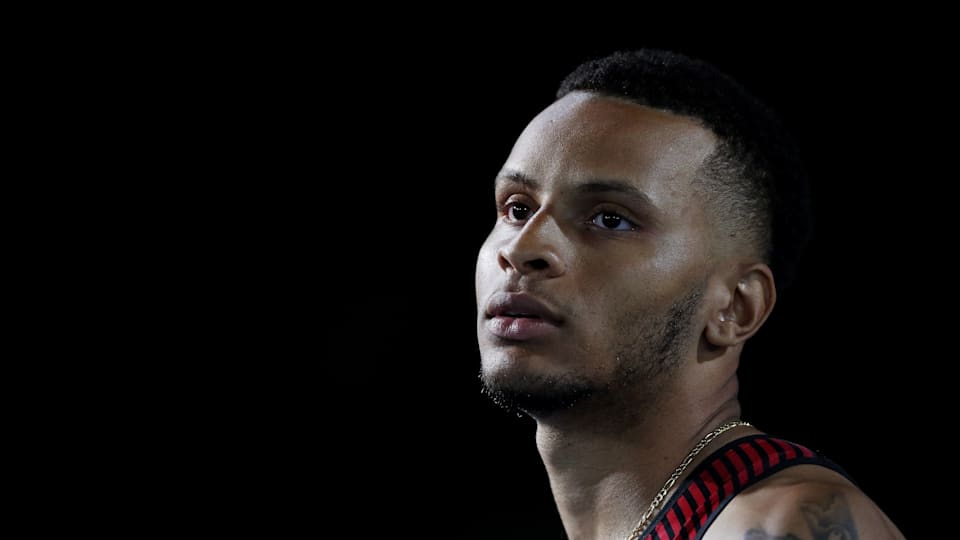
Andre de Grasse is back on the track. The Canadian sprinter made history when he won three medals at the Rio 2016 Games, including a silver medal in the 200m, where he finished a mere .24 seconds behind Usain Bolt.
A hamstring injury prevented him from competing in the 2017 World Championships in London and 2018 Commonwealth Games, but after nine months of rehab, he’s returned to racing more determined than ever.
“It’s been pretty tough coming back. I’ve definitely I’ve gotta take a lot of things more seriously,” he says. “It’s been going well these past couple weeks. I’m looking forward to trying to end the season on a bang.”
While regaining the strength he had before the injury is a slow process, it hasn’t diminished de Grasse’s career goals.
“One day of course, I want to break the Canadian record of 9.84 (in the 100m),” he says. “And then eventually take baby steps, one day at a time, and be able to break the world record and win an Olympic gold medal or a World Championship gold medal.”
In addition to re-entering competitive racing, Grasse recently launched his own foundation. The Andre de Grasse Family Foundation is a public charity dedicated to inspiring and empowering youth through sport and education.
Inspiring the Next Generation
Even in light of his athletic achievements, de Grasse will be the first to tell you that no one achieves greatness alone. That’s why he started his foundation—to provide young, talented athletes with the support they need to excel in sports and in school.
“When I was growing up, I was able to get resources and mentorship through track and field, through my coaches and my supporting staff…it was just an amazing feeling to be able to get that and see where it took me in my career,” he says. “There’s so much talent in Canada that nobody really knows about and all they need is that little extra push and that extra help to get over that hump.”
The foundation’s first initiative is the Andre de Grasse Future Champions Fund Program, which will cover athletic expenses for selected track and field athletes from Ontario high schools. Fund beneficiaries will also receive coaching, strength training, nutrition consultation, chiropractic care, academic support and training from professionals including de Grasse and Sharpe.
“I just want to see smiles on kids’ faces,” says de Grasse. “To be able to see them make it to that next level and accomplish their goals…I think that’s the biggest takeaway for me.”
Back to the Starting Line
De Grasse made the official announcement at York University’s track and field centre, where his own career as a sprinter began.
“This is the same university where I ran my first race in baggy shorts and basketball shoes, just coming here out to race my friend,” says de Grasse. “So for me, it was just an awesome feeling to come back and just launch the foundation here where it all started.”
That race was intended to be no more than a friendly competition between a few high school seniors, but it turned into much more thanks to de Grasse’s former coach Tony Sharpe. Sharpe noticed the seventeen-year-old’s incredible potential and urged him to join to track and field team. Fast forward four years, and de Grasse had become one of the world’s premier sprinters—a first-time Olympic competitor who medalled in all three sprinting events at the Rio 2016 Games.
Mother Knows Best
In addition to Coach Sharpe, de Grasse has cited his mother Beverley as one of his biggest supporters both on and off the track.
“She’s made a lot of sacrifices throughout my career and her career,” he says. “She’s just been great. She’s been my rock.”
Beverley was also a runner once, competing successfully on her high school’s track and field team.
“Even before I turned professional, she would always critique me on my race and let me know what I did wrong and what I needed to do better. It’s like she was my coach,” de Grasse recalls. “And I was like, ‘Hey, you’re not my coach. What do you know about this?’ But it’s funny, she would also tell me that she ran track and she was pretty fast. And I didn’t really believe her until I started asking her sisters and her brothers and people that were close to her growing up and they told me ‘yeah, she was fast.’”
Even though Beverley is quick to tell her son how he could improve, she’s also his biggest cheerleader.
“She always just tells me, ‘Don’t put the pressure on myself…Don’t worry about it. Shake it off. The next race will be better.’” he says.
